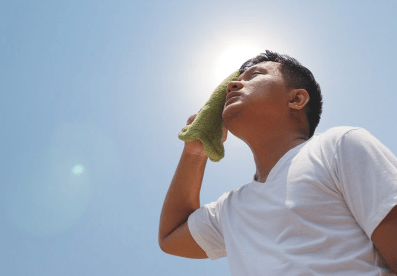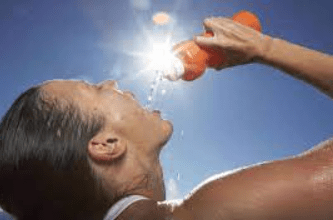Dehydration
Water is vital to human survival. When the body loses more water than it takes in, dehydration may occur. Anyone may become dehydrated, but the condition is especially dangerous for young children and older adults. The most common cause of dehydration in young children is severe diarrhea and vomiting. Older adults naturally have a lower volume of water in their bodies, and may have conditions or take medications that increase the risk of dehydration.
This means that even minor illnesses, such as infections affecting the lungs or bladder, can result in dehydration in older adults. Dehydration also can occur in any age group if you don’t drink enough water during hot weather — especially if you are exercising vigorously. You can usually reverse mild to moderate dehydration by drinking more fluids, but severe dehydration needs immediate medical treatment.
Symptoms
The signs and symptoms of dehydration also may differ by age.
Infant or young child
- Dry mouth and tongue
- No tears when crying
- No wet diapers for three hours
- Sunken eyes, cheeks
- Sunken soft spot on top of skull
- Listlessness or irritability
Adult
- Extreme thirst
- Less frequent urination
- Dark-coloured urine
- Fatigue
- Dizziness
- Confusion

Causes
Dehydration causes include:
- Diarrhea, vomiting: Severe, acute diarrhea — that is, diarrhea that comes on suddenly and violently — can cause a tremendous loss of water and electrolytes in a short amount of time. If you have vomiting along with diarrhea, you lose even more fluids and minerals.
- Fever: In general, the higher your fever, the more dehydrated you may become. The problem worsens if you have a fever in addition to diarrhea and vomiting.
- Excessive sweating: You lose water when you sweat. If you do vigorous activity and don’t replace fluids as you go along, you can become dehydrated. Hot, humid weather increases the amount you sweat and the amount of fluid you lose.
- Increased urination: This may be due to undiagnosed or uncontrolled diabetes. Certain medications, such as diuretics and some blood pressure medications, also can lead to dehydration, generally because they cause you to urinate more.
When to see Doctor
Call your doctor if you are facing a
- Has had diarrhea for 24 hours or more
- Is irritable or disoriented and much sleepier or less active than usual
- Can’t keep down fluids
- Has bloody or black stool
Risk Factor
Anyone can become dehydrated, but certain people are at greater risk:
- Infants and children.The most likely group to experience severe diarrhea and vomiting, infants and children are especially vulnerable to dehydration. Having a higher surface area to volume area, they also lose a higher proportion of their fluids from a high fever or burns. Young children often can’t tell you that they’re thirsty, nor can they get a drink for themselves.
- Older adults.As you age, your body’s fluid reserve becomes smaller, your ability to conserve water is reduced and your thirst sense becomes less acute. These problems are compounded by chronic illnesses such as diabetes and dementia, and by the use of certain medications. Older adults also may have mobility problems that limit their ability to obtain water for themselves.
- People with chronic illnesses.Having uncontrolled or untreated diabetes puts you at high risk of dehydration. Kidney disease also increases your risk, as do medications that increase urination. Even having a cold or sore throat makes you more susceptible to dehydration because you’re less likely to feel like eating or drinking when you’re sick.
- People who work or exercise outside.When it’s hot and humid, your risk of dehydration and heat illness increases. That’s because when the air is humid, sweat can’t evaporate and cool you as quickly as it normally does, and this can lead to an increased body temperature and the need for more fluids.
Treatment
If you suspect you are dehydrated, it is important to rehydrate. In addition to water, oral rehydration solutions (e.g., Pedialyte) are good options for mild to moderate dehydration because they provide electrolytes and carbohydrates, which help your body absorb water better.
For infants and children who have become dehydrated from diarrhea, vomiting or fever, use an over-the-counter oral rehydration solution. These solutions contain water and salts in specific proportions to replenish both fluids and electrolytes. Start with about a teaspoon (5 milliliters) every one to five minutes and increase as tolerated. It may be easier to use a syringe for very young children. Older children can be given diluted sports drinks. Use 1 part sports drink to 1 part water. Most adults with mild to moderate dehydration from diarrhea, vomiting or fever can improve their condition by drinking more water or other liquids. Diarrhea may be worsened by full-strength fruit juice and soft drinks If you work or exercise outdoors during hot or humid weather, cool water is your best bet. Sports drinks containing electrolytes and a carbohydrate solution also may be helpful. Children and adults who are severely dehydrated should be treated by emergency personnel arriving in an ambulance or in a hospital emergency room. Salts and fluids delivered through a vein (intravenously) are absorbed quickly and speed recovery.
Prevention
People may need to take in more fluids if they are experiencing conditions such as:
- Vomiting or diarrhea.If your child is vomiting or has diarrhea, start giving extra water or an oral rehydration solution at the first signs of illness. Don’t wait until dehydration occurs.
- Strenuous exercise.In general, it’s best to start hydrating the day before strenuous exercise. Producing lots of clear, dilute urine is a good indication that you’re well-hydrated. During the activity, replenish fluids at regular intervals and continue drinking water or other fluids after you’re finished.
- Hot or cold weather.You need to drink additional water in hot or humid weather to help lower your body temperature and to replace what you lose through sweating. You may also need extra water in cold weather to combat moisture loss from dry air, particularly at higher altitudes
- Older adults most commonly become dehydrated during minor illnesses — such as influenza, bronchitis or bladder
- Make sure to drink extra fluids when you’re not feeling well.


